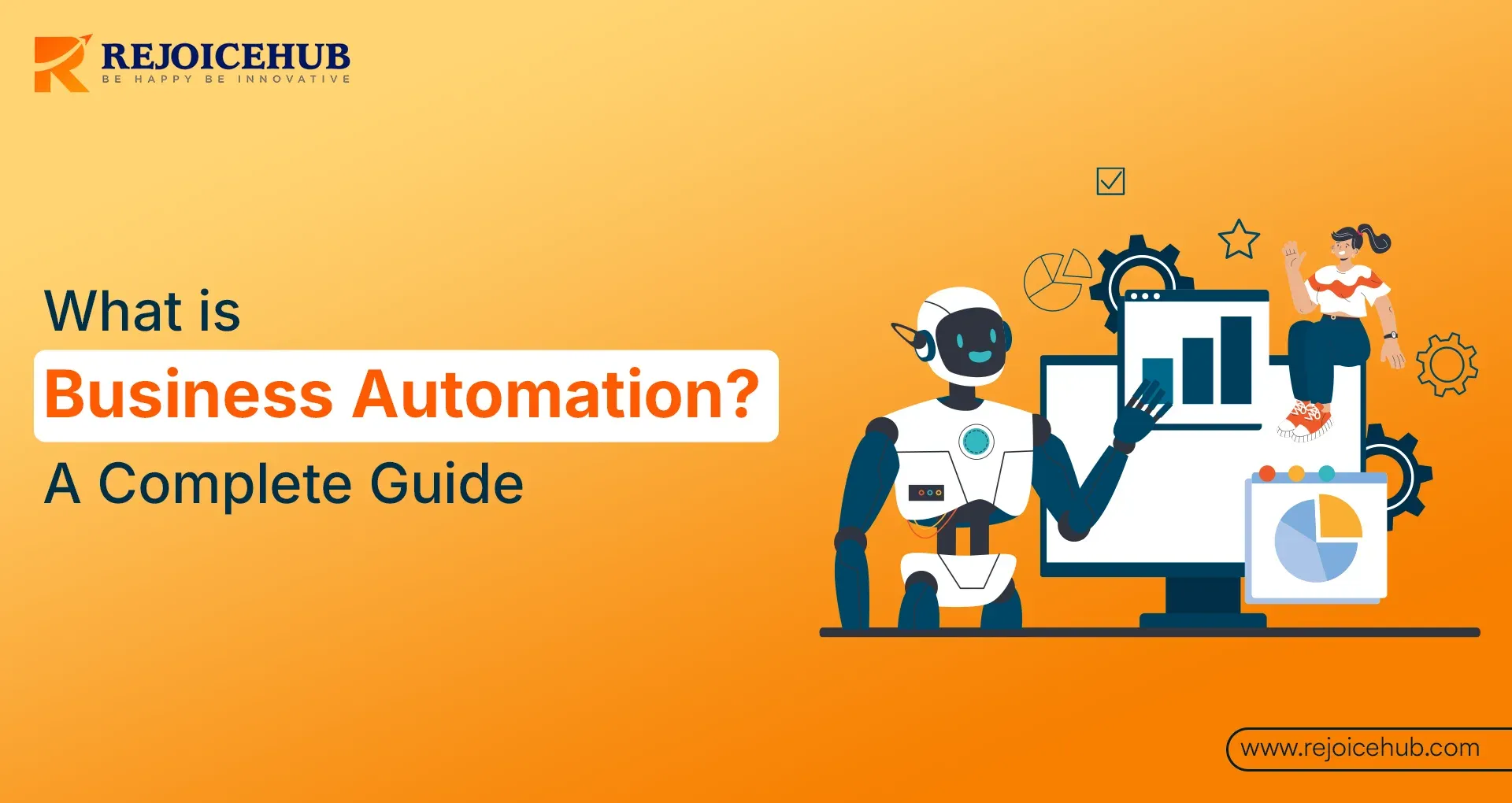 Just imagine you own a business and your business's small, repetitive tasks are being managed automatically, like important client emails being sent automatically, invoices being processed in seconds, or your customers' queries being resolved instantly. It all sounds quite imaginary, but in today's world of AI agents and chatbots, it's quite possible, and that's what "business automation" is all about.
Just imagine you own a business and your business's small, repetitive tasks are being managed automatically, like important client emails being sent automatically, invoices being processed in seconds, or your customers' queries being resolved instantly. It all sounds quite imaginary, but in today's world of AI agents and chatbots, it's quite possible, and that's what "business automation" is all about.
I've personally seen many businesses that have benefited greatly from business automation, saving them significant time and money. Their working speed and efficiency have also increased, enabling them to work smarter and faster than before. This has enabled businesses to work with more creativity, innovation, and strategy.
In today's detailed article, we will learn about business automation in detail, so that you can use automation in your business as well. For this, we will study and understand research papers from IBM, Microsoft, and Salesforce in simple steps to gain industry-level knowledge.
Quick Summary
Business automation isn't a new concept; it's been around for a long time. However, in the world of AI and technology, this automation is capable of performing tasks without any human intervention. While earlier automation technologies focused on reducing employee workload, automation requires human skills and intervention. However, with the advent of multi-modal systems, it's become possible to completely automate any task.
Basically, business automation refers to how you use technology to handle repetitive tasks so that time-consuming tasks are completed easily. For this, RPA (Robotic Process Automation), BPM (Business Process Management), and AI-powered systems are used to simplify workflows.
Companies are adopting automation to increase productivity and deliver better customer satisfaction, all while incurring lower investment costs.
Our focus in this article:
- What is business automation, and why is it important?
- What technologies are used for business automation?
- Why are businesses prioritising automation so much?
- How should businesses choose the right automation partner?
What is Business Automation?
Business automation, simply put, is a process that uses technology to execute repetitive or structured tasks that require human effort. This could allow you to add new, expert employees to your business without having to pay them a salary.
Using business automation, you can handle everything from invoice management to HR processing. Currently, automation is most commonly used for customer support, making it much easier and smoother to manage everything from your customers to employee operations.
Nowadays, automation isn't just limited to large enterprises; with the advent of cloud-based automation tools, even small startups can deploy AI agents for their operations without hiring new employees.
How It Works
Business automation is divided into several layers and technologies based on the operations used. For example, automation in the medical and Healthcare sector will be quite different from automation in the manufacturing sector.
Robotic Process Automation (RPA): RPA is most commonly used for digital repetitive tasks, such as data entry and file movement.
Business Process Automation (BPA): It is used to improve the workflows of different departments. And in this, Artificial Intelligence (AI) & Machine Learning (ML) are used to make smarter data-based decisions, and the most special thing about this is that it helps businesses a lot in making manual decisions, because most of the decisions are data backed.
For Example: A company which needs 10 Human customer executives for replies and queries resolution to the customers, if it uses RPA bots in its department, then its customer support operation can be done automatically without any employees. This will also reduce the operational burden on the company to a great extent.
According to the IBM Institute for Business Value report, nearly 92% of business executives plan to deploy AI-powered automation by 2026, which gives us a clear idea of the need for business automation.
The Real Purpose
The primary goal of business automation is not only to save time, but also to enhance human potential. When machines handle repetitive tasks, employees can focus on strategy, creativity, and relationship building.
IBM also highlights in many of its business reports that automation will not only help businesses streamline workflows but also generate more revenue in this challenging market.
Why is Business Automation Important?
Be it a local shop or a multinational company, the reason that makes automation very important is simple: efficiency. In a world where customers are looking for instantaneous services and companies are racing against each other, automation keeps you one step ahead.
1. Drives Scalability
Manual operations limit the scaling of a business. Automation, however, allows you to run thousands of operations at a time with absolutely no increase in employees. For example, AI-powered tools process hundreds of customer requests in one go, thus reducing the response time massively.
2. Enhances Decision-Making
AI-enabled automation solutions don’t just follow instructions; they analyze data and provide intelligent recommendations. Businesses can utilize machine learning to find patterns, predict customer behaviour, and come to rapid but rational decisions.
As someone who has been involved in automating for clients, the ability to make data-based decisions is one of automation’s most underappreciated superpowers.
The Benefits of Business Automation
We are seeing many benefits of using business automation in the industry, and the core benefits are different for all sectors, like worker safety has improved a lot in the manufacturing sector, and customer support has improved a lot in the IT sector, but let us know about the core advantages that we are seeing.
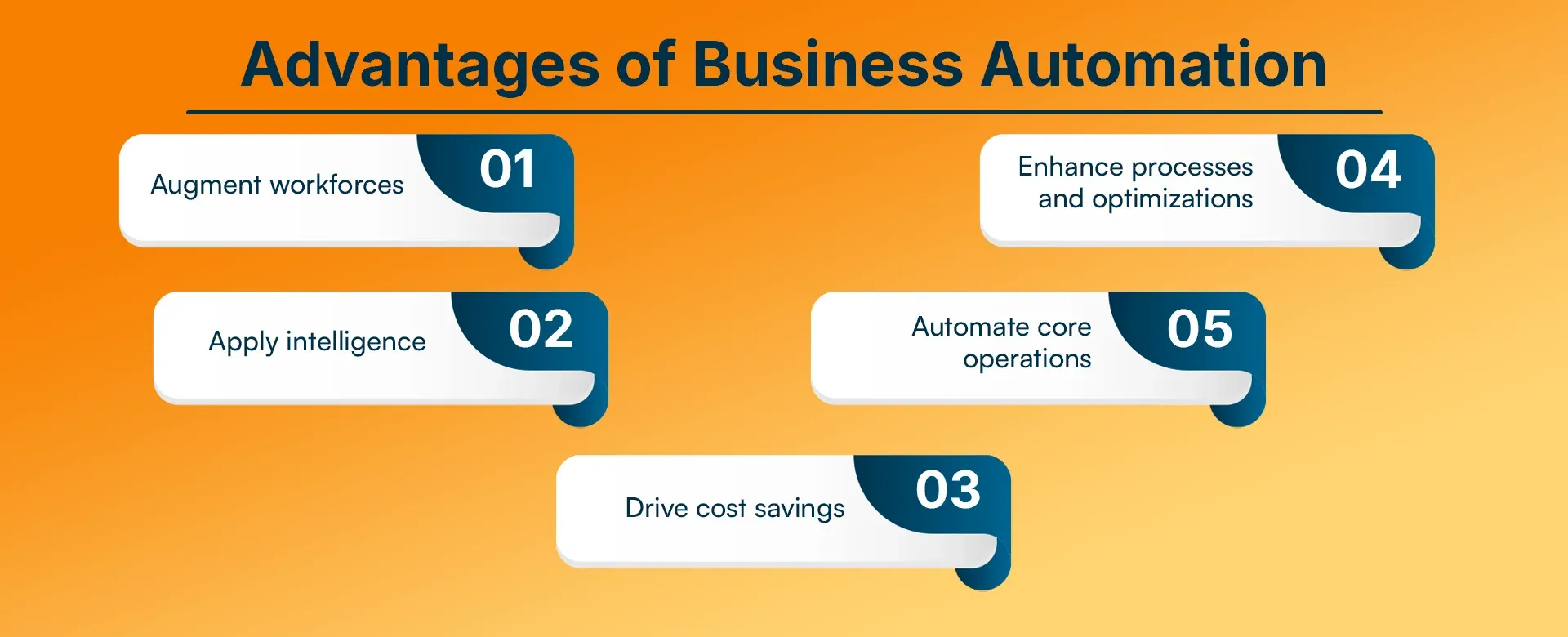
1. Augment Workforces
Automation does not displace human beings; it improves them. Imagine an online colleague who does all the boring stuff so that your team can be able to concentrate on the strategy and innovation.
IBM refers to these digital workers who are in charge of data processing and scheduling, as well as report generation. The result? Reduced time to decide and satisfied employees.
2. Apply Intelligence
Contemporary automation is not only rule-based; it is AI-based. They can make an analysis of sales forecasts and predict customer churn as well as identify trends which is not possible with a human analyst with machine learning.
This intelligence application capability makes automation no longer a mere performer but an important business counsel.
3. Drive Cost Savings
Automation of routine tasks helps companies to save the cost of human resources as well as minimize errors. It was reported that one of the IBM clients saved $40,000 a quarter through financial process automation.
Automation also enables companies to achieve much with a minimal amount of resources, which directly impacts profitability.
4. Automate Core Operations
Automation in document processing to decision management keeps all the core operations running comfortably. It assists in coordinating workflows and consistency within the departments with a reduction in the bottlenecks.
5. Improve Processes and Optimizations
Automation gives information in real time on what makes working and what does not. This allows the companies to realize the inefficiencies and correct them in real time - establishing a culture of continuous improvement.
Different Kinds of Business Automation
There are many types of business automation, and automation of the medical sector is quite different, and IT companies have different automation requirements. Automations are designed in different types according to the business requirements.
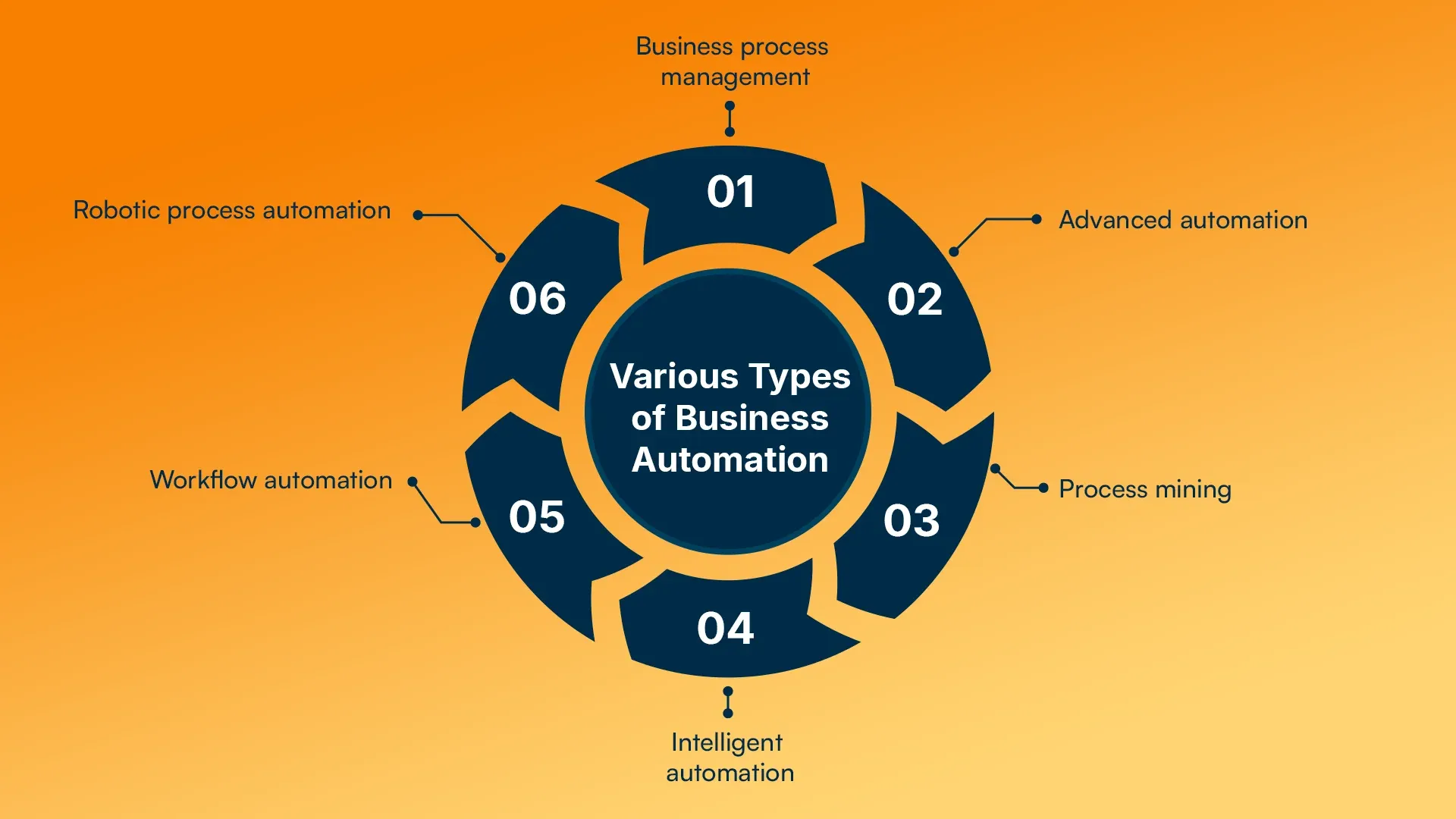
1. Business Process Management (BPM)
BPM is concerned with the enhancement of the end-to-end business processes. It assists an organization in analyzing, measuring, and optimizing the workflow. But, contrary to project management, BPM does not only consider individual projects; it makes sure that the whole system is efficient.
2. Advanced Automation
This is the point at which human beings and machines actually cooperate. Adaptive automation The process is advanced, combining AI, natural language processing (NLP) and machine learning to control complex processes. It is best suited to activities involving analysis of data, reasoning or decision-making.
3. Process Mining
Process mining involves data logs and algorithms, which help to reveal the actual process of how things occur in practice. It determines bottlenecks, inefficiencies, and improvement opportunities - assists companies in rectifying problems before they occur.
4. Intelligent Automation
Intelligent automation is a combination of AI + automation. It enables the systems to learn and make intelligent decisions based on data, and it gets better with time. As an illustration, AI chatbots are able to manage 90% of customer inquiries, and leave any remaining to human agents, which will save time and enhance satisfaction.
5. Workflow Automation
Automation of workflow substitutes human processes with software-acquired processes. Applications such as IBM Cloud Pak for Business Automation may facilitate automation of HR processes, finance, and reporting processes - enhancing productivity and visibility.
6. Robotic Process Automation (RPA)
RPA has bots to simulate human activities within digital systems - e.g., filling in forms, copying data, and handling files. It is helpful particularly in finance, HR, and operations, where consistency as well as accuracy is paramount.
Business Automation Applications in Real Life
Automation is not merely a hypothesis, but it is altering the world's industries. The following can be considered real-life applications.
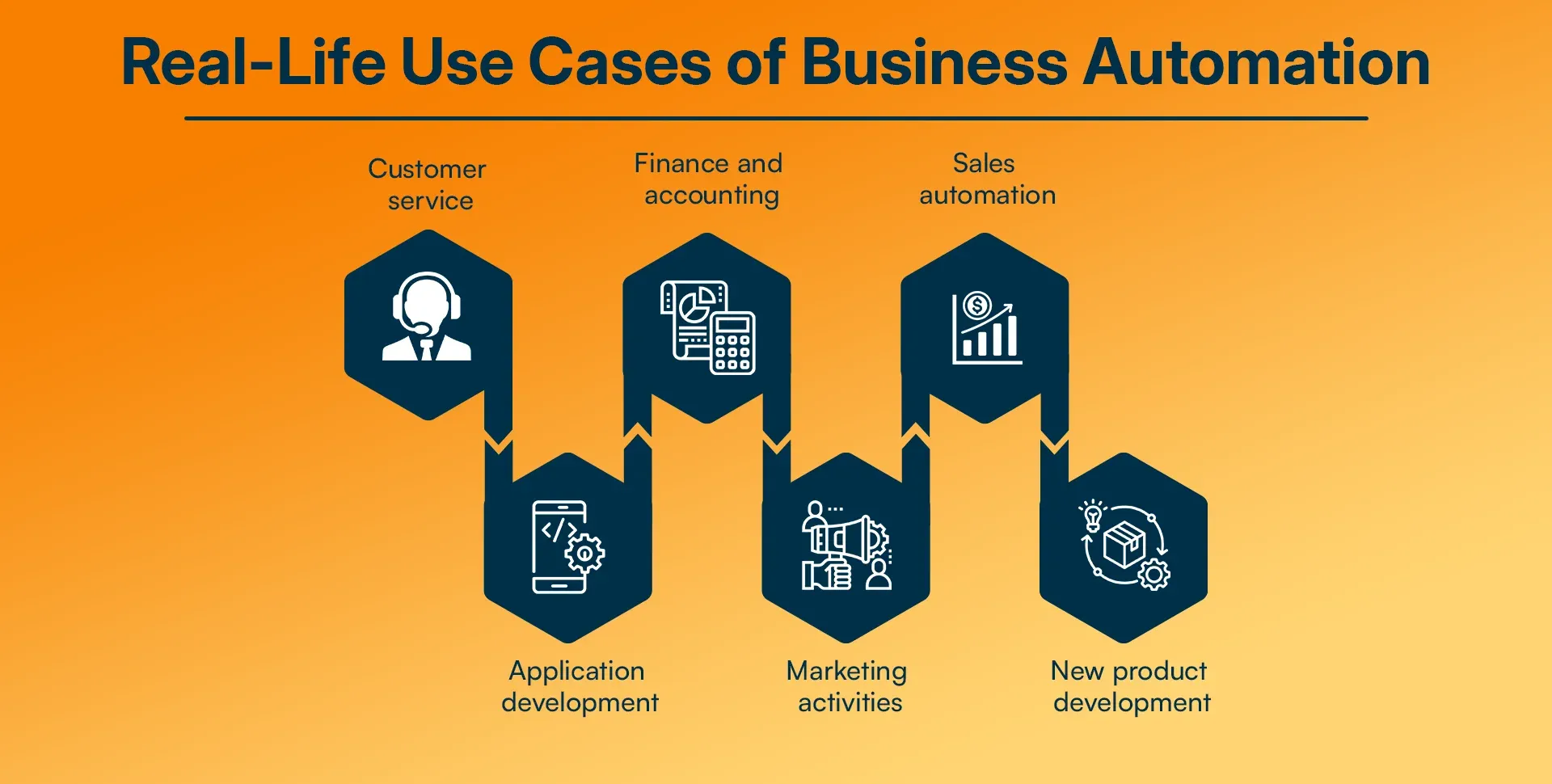
1. Customer Service
Millions of customers are being interacted with every day by AI-powered chatbots. They respond to queries, book tickets and even get feedback - so that a customer does not queue to get any assistance.
2. Application Development
Automation accelerates the development of the application through automatic writing, testing, and deploying software. As an illustration, the VLI, a company in the logistics industry, used IBM to automate the process of software programs, which were labour-intensive, leading to 99 per cent faster approvals in access.
3. Finance and Accounting
Invoice matching, payment reconciliation and the generation of reports can be automated by accounting teams. IBM helped one Swiss reinsurer save 40,000 dollars per quarter by automating its financial closing process.
4. Marketing Activities
Email campaigns, posts in social media and CRM updates can be automated. With businesses now capable of sending personalized messages upon a user action, interest in the message will be increased and the conversion rates will be improved.
5. Sales Automation
Sales force applies such tools as Salesforce to automatize the lead scoring, follow-ups, and deal tracking. These tools also automatically set prices in accordance with the current demand, which leaves the sales reps to be able to concentrate on building relationships.
6. New Product Development
The automation is able to boost innovation. An example is Komatsu, which streamlined digital product development with IBM automation tools, and a 30% faster launch cycle was realized.
Business Automation Evolution
As we all know that automation is not a new concept, and automation has evolved in every decade. But in the next 5 years, business automation is going to evolve a lot because of machine learning and NLP. Let us understand it in detail.
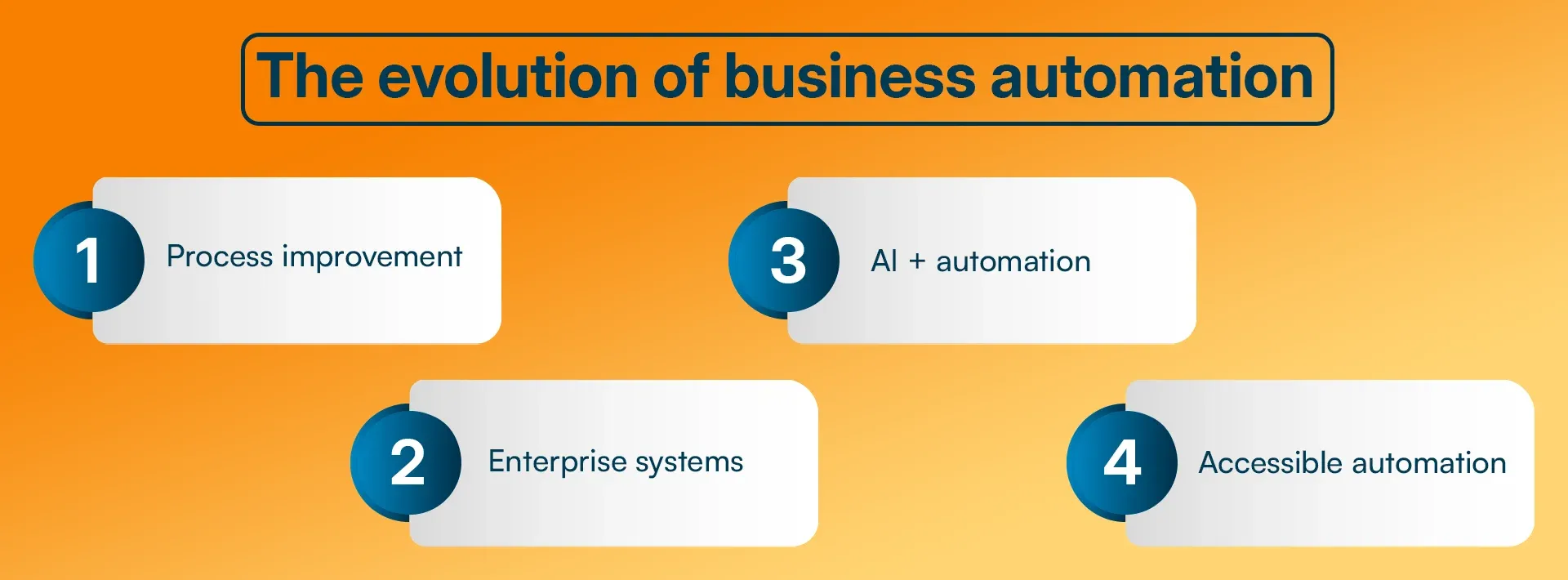
1. Process Improvement Era
First, automation was aimed at making routine tasks easier, such as in document management and data entry. This was the period that laid the platform of efficiency.
2. Enterprise Systems Era
Then there were enterprise automation tools, which were massive systems integrating the departments of HR, finance, and operations. This opened up end-to-end visibility for the first time.
3. AI + Automation Era
The greatest revolution was the one when AI met with automation. Machines began to think. Creativity machines began to predict, recommend, and optimize themselves. This was the age of smart automation.
4. Accessible Automation Era
Nowadays, automation is available to all people via cloud-based services. Automation can be an inherent part of the business process of any magnitude, no code, or massive infrastructure is needed.
How to Select the Most Successful AI Automation Company
The way business is conducted in the modern, dynamic digital world is that every organization desires to work smarter rather than harder. The automation of AI has become the key to efficiency - it has helped firms to save time, cut costs, and enhance customer experiences.
However, with hundreds of automation vendors that purport to be the best, how do you select the appropriate AI automation company for your business?
1. Determine Your Automation Requirement
Prior to choosing a company, find out what you are intending to automate, which could be customer service, workflows, marketing, data analysis or finance. It might need various tools and skills in each area. An effective automation partner will begin by learning your business issues and developing a business-focused approach instead of retailing a canned solution.
2. Test their Technical Competence
The most successful automation firms with AI integrate artificial intelligence, machine learning (ML), and robots. Determine whether they experience using such platforms as IBM Cloud Pak, UiPath, or Microsoft Power Automate. In addition to that, investigate their case studies - how many customers have they served, and what quantifiable outcomes have they provided?
3. Find Scalability and Integration
Your business should expand, so should your automation system. Select a company providing scalable solutions and able to connect with your existing solutions, such as CRMs, ERPs, or cloud systems. This way you are not in compatibility trouble in future. For automation deployment, you can prefer firms like RejoiceHub, which is leading in machine learning and automation.
4. Assess Securities and Compliance
Artificial Intelligence automation can be related to sensitive information. Make sure that the enterprise-level security measures are implemented in the company, it adheres to encryption and data protection regulations such as GDPR or ISO standards. Make inquiries on their policies regarding privacy and data handling.
5. Take into Account Support and Long-Term Partnership
Automation is never a project but a process. The appropriate company provides updated and constant support and training. Find partners that appreciate teamwork and do not think only in the short term but long term.
Conclusion
It is not that business automation is the future, but it is now. It is already transforming the way we work, serve customers, as well as scale businesses.
Automation does not only reduces costs but actually improves human creativity, efficiency and development when done in a strategic manner.
Being a person who has been working closely with AI-driven systems, I have witnessed myself how automation can make a business that was struggling to its knees into a work powerhouse. And hence I would advise you to first take help of IT firms like RejoiceHub for automation deployment in small operations and after that you should track common activities and accordingly choose appropriate tools so that scaling in future becomes easy.
According to My Experience, the focus of automation is never to replace humans; rather, its focus is to help humans in repetitive tasks so that humans can solve real problems. Hence, if you are a business owner, then you must use automation, and if you are an employee, then you must gain skills to remain relevant in the industry.
FAQs
Frequently Asked Questions
1. Why is business automation important?
This is aimed at automating routine activities, minimising errors, and liberating human workers to perform more important activities such as strategy and innovation.
2. Can business automation only be applied to big companies?
Not at all. The cost of automating workflows is affordable even for small and medium-sized businesses when it comes to cloud-based tools. Automating depends largely on the requirements and company workflows, whether they truly require automation or not.
3. So what is the distinction between RPA and BPA?
RPA involves the implementation of bots to automate certain tasks, whereas BPA emphasizes the whole process of a business to be optimized.
4. What is the role of AI in improving business automation?
AI enables automation tools to process data, draw conclusions based on trends and make more intelligent and speedy decisions - transforming straightforward automation into intelligent automation.
5. What is the best way to begin automating my business?
Start with the discovery of repetitive processes, and try low-cost solutions, such as Zapier, IBM Cloud Pak, or UiPath. Gradually increase the size as you get results. When you start small, you have data available that you can use as you expand your automation.
6. What industries benefit most from business automation?
I think almost all industries will benefit from business automation, whether it's finance, healthcare, retail, or manufacturing, but the IT sector will benefit the most. Hospitals will also be able to use it to better handle patient data. E-commerce platforms will be able to more effectively manage their inventory and order tracking.
7. Does automation lead to job losses?
This is a very common misconception. And automation isn't focused on replacing people, but rather on automating repetitive tasks so that employees can focus on strategic, creative, and relationship-based work. In fact, many companies report increased business growth or customer satisfaction through business automation.
8. How secure is business automation?
Modern automation tools are built on enterprise-grade security, including encryption, regulations like GDPR, and controls. Always choose a large or trusted automation provider so that your workflow can be regularly audited and your data safety maintained.
9. What are some challenges in implementing business automation?
The biggest challenges for businesses are integration, cost, and management, as it's difficult to deploy automation smoothly without them. This is why businesses face significant challenges with new automation tools, as they are difficult to deploy and manage within existing systems. However, if small businesses follow a set path, they can easily deploy AI automation.
10. Can automation improve customer experience?
I think definitely, the automation that happens enhances the customer experience to a great extent, because customers do not have to wait for a reply from a human executive, and they get 24/7 company support.
